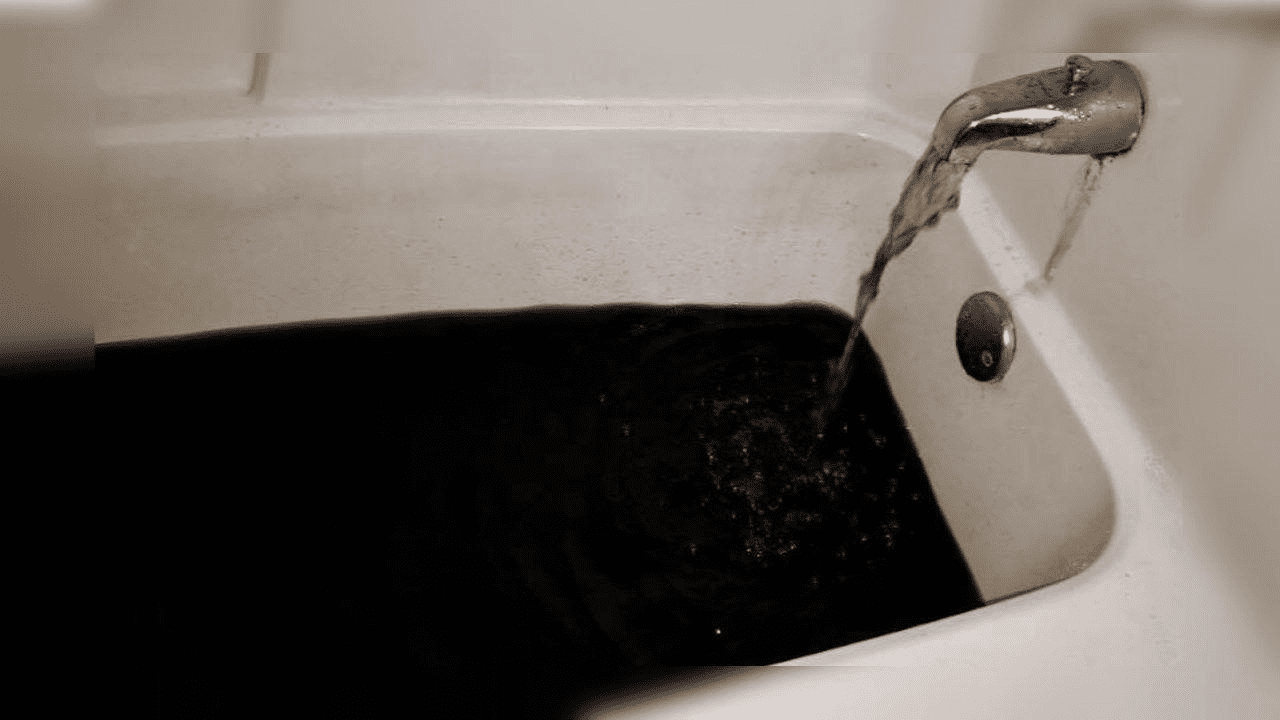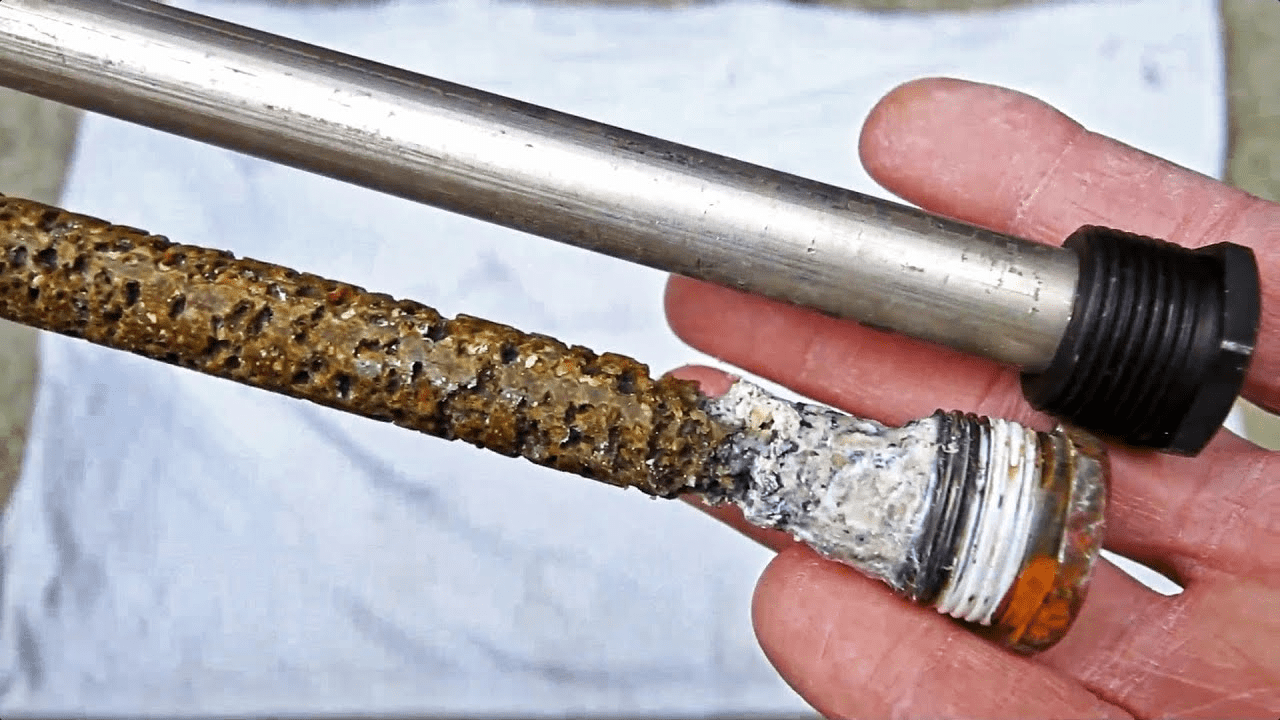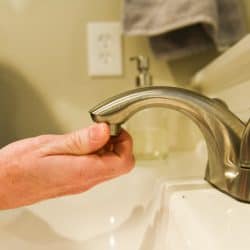Have you ever reached out to your tap faucet, and the water that comes out of it has a black color? It’s more annoying because you most likely went to the tap expecting clean water, not putting more dirt.
However, after reading this article, you will understand why there’s a black water deposit out of your faucets and what you can do to stop it.
Black water from your faucets is a natural occurrence that you can expect. There’s no need to fear or call your water supply authority.
Let’s review some common causes and solutions to black water in your faucet.
JUMP TO: Causes of Black Water From Faucet | Bottomline |
- Black water is natural, as it may indicate the presence of magnesium.
- It can also signify mold and mildew growth in your pipes.
- Rusty pipes can also cause black water out of faucets
- Calling an expert to check your plumbing system is the best solution.
What Are The Causes of Black Water In Your Faucets?
You don’t need to panic when you see black water out of your faucets. A better action will be to check another tap to be sure of how bad the problem is. If all taps have this black water when you check, there is still no need to panic.
There are multiple reasons for black water coming from your faucet, and they have their respective solutions. Before you can find a solution, you must learn the cause. Some of the common causes include;
Presence of Minerals
The water from your faucet may look pure and clean, but it usually has a lot of particles within it. Some of these particles are harmless minerals that benefit you, while others may be dangerous.
Every water system has deposits of natural minerals like manganese, iron, and magnesium. Magnesium, in particular, is the most present metal from the source, seawater, after sodium.
Also Read: Kitchen Faucet Vs. Bar Faucet
The presence of this water in your water supply system has little effect on the water quality. But due to oxygen in the water, there is an oxidation reaction between the metal and oxygen. This reaction forms the black deposits you may see in your faucets when you need water.
Usually, if the black water cause is magnesium, you will have started noticing some early signs. Before the black deposits become visible, the water will exhibit the properties of hard water. A good sign is when your water requires a lot of soap before it foams.

Source: The Chronicle Flask
CAUTION: Black water can also mean danger in the water; it’s not always minerals.
Solution
Before spending money on a solution, it’s always better to confirm that mineral deposits are the actual issue. You only need to purchase a testing kit online that can detect the presence of metals in the water.
Once confirmed, you have two solution options.
- You can either install a filtration system that filters the mineral flakes from the water
- or a softener that removes the magnesium.
TIPS: Installing a water softener system is the better option, as it has other benefits for your clothes and skin.
Old and Rusty Pipes
If you have a metal-run plumbing system, your pipes may cause the black water coming from the faucets. The pipes are prone to rusting whether your pipes are from pure or galvanized steel.
When the steel rusts, tiny deposits of rust flow around the pipe, mixing with oxygen and other metals in the water. This will give a dark color when the water comes out.
Generally, black water coming because of your rusty pipes doesn’t have any harm.

Source: iStock
Solution
The best way to confirm that the rusty pipes are the culprit is by noticing the darkest deposits of rust in the water.
When you notice this, the best thing is to call a plumber to check the pipes. You may need a replacement of some of the affected pipes.
TIPS: If the pipes are relatively new, the rusty pipes are most likely not the cause.
Mold and Mildew
The growth of mold and mildew is another cause of black water from your faucets. This is a dangerous cause, contaminating the water and affecting you.
Mildew and mold can grow within the pipes due to water damage, spreading rather quickly.

Source: Lansing State Journal
Solution
The only solution to black water coming through faucets because of mold and mildew is first to stop using the water. There is a high chance that black mold is present, and it can trigger allergies and cause respiratory issues.
After that, call an expert to check your whole water system appropriately. Usually, mold and mildew give off an awful smell. Therefore, it may be mold if you smell something irritating when the water comes out.
Also Read: Brass Vs. Stainless Steel Kitchen Faucets
Outdated Filter System
Water systems have a filtration system that helps to prevent black water which comes from mineral deposits. These systems work by filtering off the metals and other minerals in the system.
The systems use granular activated carbon to function optimally. This compound helps remove chemical compounds from water and tastes and odors.
Over time, the granular activated carbon loses its effectiveness, giving way to these particles to go through the water.
Solution
If the water filtration system is the cause of the black water in your faucet, it is usually an easy fix. You can fix it yourself if you have the right tools and experience.
All you need to do is open the filtration system, buy the exact cartridge, and change it. You can test the system for black water after replacement.
Water Softener System
Like the water filtration system, the water softeners are also a preventive measure to black water in your faucet. Similarly, black water from the faucet could indicate a problem with the water softener system.
The water softener works with resin beads arranged in its tank. These natural resin beads contain soft ions that reduce water hardness through an ion exchange that occurs.
Sometimes, the beads are dark and can dissolve into the water, causing a dark color.
Solution
The only solution required in this situation is replacing the resin beads in the softener system. This step requires expertise, so it is better to have your plumber look at it.
Water Heating Issues
Your water heater can sometimes cause the black deposits you notice in the faucets. If the water heater is the problem, there are two possibilities.
- Either the minerals in the water build up as sediments
- or the anode rod reacts.
Over time, water going through your heater contains minerals like magnesium and iron, as mentioned above. These minerals may settle at the bottom of the meter, and when they react with oxygen, the heater can give off black water.
On the other hand, the anode rod in your water heater has the sole purpose of protecting the lifespan of the water tank at its expense. Over time, the anode rod may react with the water and cause black deposits in the faucets.
Solution
First, you need to confirm that the problem is with the water heater. Confirming is simple; all you need to do is confirm if the black deposits occur with cold and hot water. Cold water shouldn’t pass through the water heater, so if it has deposits, the heater is not the problem.
After you confirm the water heater as the culprit, you either need to clear the sediments or replace the anode rod. It’s better to leave both solutions for an expert to do, as it is a bit tricky.

Source: Youtube
Conclusion
Many reasons are causing your faucet to deliver black water. Determining the main cause may be a daunting task.
For instance, apart from the causes discussed above, sand and clay can cause black deposits in your faucet. This scenario usually occurs when you’re using a private well for water.
When you see black water, the best thing to do is confirm the easier possibilities. You can use a test kit for the minerals and check for rust particles if you suspect the pipes.
However, when you can’t find any real cause, call a plumber to help you check the issue.
![16 Types of Kitchen Faucets Explained [With Pros + Cons] 16 Types of Kitchen Faucets Explained [With Pros + Cons]](https://houseadorable.com/wp-content/uploads/2023/02/Roca_griferia_cocina_mencia_negro_DEF_900x505_acf_cropped-1@2x-250x250.jpg)
![Centerset Vs. Widespread Faucets [8 Differences Explained] Centerset Vs. Widespread Faucets [8 Differences Explained]](https://houseadorable.com/wp-content/uploads/2023/03/1_332369605_6500081363358836_8480186754416832788_n-250x250.jpg)
![Kitchen Faucet Vs. Bar Faucet [What is The Difference] Kitchen Faucet Vs. Bar Faucet [What is The Difference]](https://houseadorable.com/wp-content/uploads/2023/01/GettyImages-1177440335-0210e69740fd4045ab6a88f1588e9f4f.jpg)
![Pros and Cons of Wall-Mounted Faucets : [Includes Buying Guide] Pros and Cons of Wall-Mounted Faucets : [Includes Buying Guide]](https://houseadorable.com/wp-content/uploads/2023/02/s-l1600-250x250.jpg)
![Chrome Vs. Stainless Steel Faucets: [An In-Depth Analysis] Chrome Vs. Stainless Steel Faucets: [An In-Depth Analysis]](https://houseadorable.com/wp-content/uploads/2023/03/51gDGcVWBL._AC_UF10001000_QL80_-250x250.jpg)


![How to Increase Water Pressure In My Kitchen Sink? [Methods Explained] How to Increase Water Pressure In My Kitchen Sink? [Methods Explained]](https://houseadorable.com/wp-content/uploads/2022/12/water2.jpg)